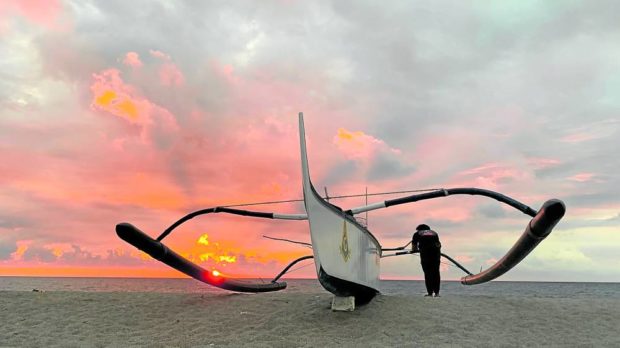
BOUNTY FROM THE SEA | Many fishermen in Zambales depend on their catch from waters near Panatag Shoal in the West Philippine Sea to sustain their families. (Photo by JOANNA ROSE AGLIBOT / Inquirer Central Luzon)
MASINLOC, Zambales, Philippines — Fishermen in this coastal province are bent on resisting the China-imposed unilateral fishing ban in the South China Sea that extends into the West Philippine Sea (WPS).
Leonardo Cuaresma, leader of the New Masinloc Fishermen’s Association in this town, which faces the WPS, said they would rather act like “thieves” in their own fishing grounds at the Panatag Shoal, locally known as Bajo de Mansiloc, than bow to China.
“Even though we are scared because most of us were harassed and bullied by the Chinese coast guards in the shoal, we still take those risks just so our families will have food on the table every day,” Cuaresma told the Inquirer.
Cuaresma stressed that China has no right to impose such a ban since it has no proof that it owns the shoal and other contested territories in the WPS.
“If the government tells us to just comply with the ban, it leaves us with no other option but to sneak into our own fishing grounds,” Cuaresma said.
For Joselito Marabe, another fisherman, the unilateral ban was another kind of intimidation by China, which he said was also an “unjust treatment” of Filipino fisherfolk.
“I hope the national government can see through our needs and the struggles we are facing,” Marabe said.
Bajo de Masinloc serves as the traditional fishing ground of Filipino fishermen as it is situated inside the country’s 370-kilometer exclusive economic zone.
China, which has sweeping claims in nearly all of the WPS, seized control of the shoal in 2012, prompting the country to seek the United Nations’ arbitration. In 2016, the arbitral tribunal invalidated China’s sweeping claims, but China continues to ignore the ruling.
Hopeful
Cuaresma said he was still hopeful that the administration of President-elect Ferdinand Marcos Jr. would make a move and respect the rights of all the Filipino fishermen to fish in the country’s territorial waters.
Bobby Roldan, vice chair for Luzon of fisherfolk’s group Pamalakaya, said his group was encouraging Filipino fishermen not to recognize the Chinese fishing ban, and to continue with their fishing operations in the Philippine waters.
“Our fisherfolk members will never comply as we affirm that China has no political and moral ascendancy to impose a fishing moratorium in our exclusive economic zone,” Roldan said in a statement on Monday.
China has been imposing the annual ban since 1999, citing the need to develop sustainable marine life due to overfishing in the area. It started in May and will last until mid-August.
The group slammed China for using “marine biological conservation” as a pretext for the three-and-a-half-month fishing ban.
“The audacity of China to impose a fishing ban on the pretext of marine conservation when it is the one plundering our marine waters through its aggression,” Roldan said.
Pamalakaya also dared the government to “go beyond diplomatic protest” and mobilize local maritime authorities to ensure the safety of Filipino fishers who will venture into the WPS amid the Chinese fishing ban.
RELATED STORY
Amid China fishing ban, PCG to escort Filipino fisherfolk in West PH Sea